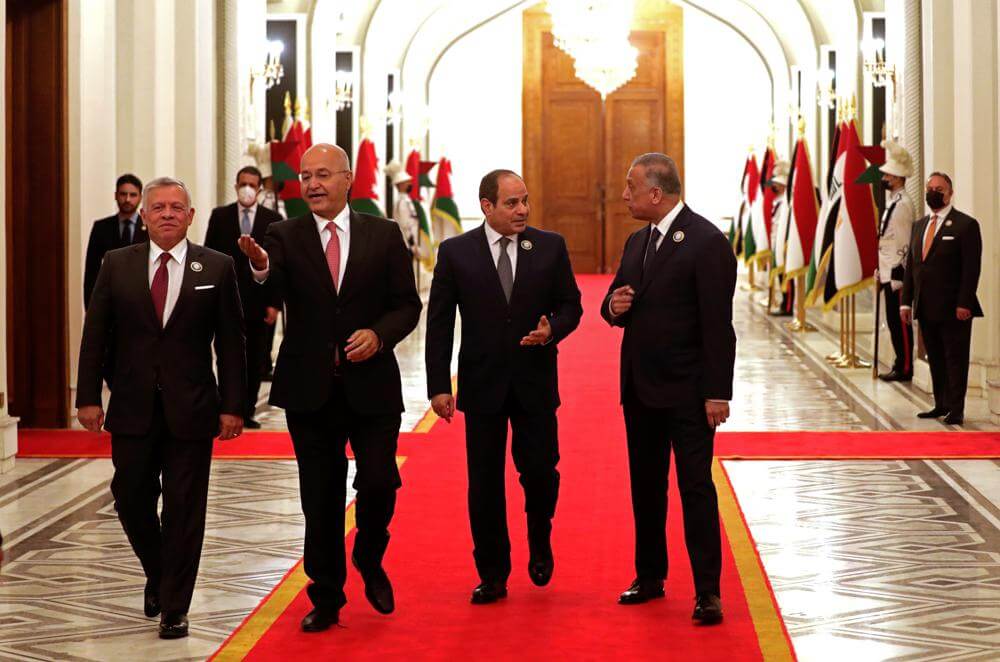The leaders of Egypt, Iraq, and Jordan met in Baghdad on Sunday to hold tripartite talks aimed at bolstering regional and security ties, especially in light of Iran’s growing regional influence.
Egyptian President Abdel Fattah El-Sisi’s official visit to Iraq’s capital Baghdad is the first in over 30 years by an Egyptian leader since former Iraqi President Saddam Hussein invaded Kuwait in 1990, which ruptured diplomatic ties between the two countries.
Iraqi President Barham Salih and Prime Minister (PM) Mustafa al-Kadhimi hosted Egyptian President El-Sisi and Jordanian King Abdullah II at the presidential palace in Baghdad. The foreign ministers of Egypt, Iraq, and Jordan—Sameh Shoukry, Fuad Hussein, and Ayman Safadi—also held a separate meeting in Baghdad as part of the talks.
The Associated Press (AP) reported that the meetings were held to discuss efforts to neutralise Iran’s influence across the Middle East, especially in Iraq. “Iraq must be isolated from regional interventions,” Jordanian Foreign Minister Safadi said about Iran’s growing clout in Iraq. He added that the trio should “face these [Iranian] challenges in an effective manner […] that protect our national security and enhances Arab national security in general.”
Iran’s influence over Iraq is vast and is a result of years of efforts. In 2019, The Guardian reported that Iranian intelligence officers “infiltrated” the country’s political cabinet and military leadership. Iran has also been accused of using Shia militant groups and politicians to further its interests in Iraq. Furthermore, the Iran-backed Popular Mobilisation Forces (PMF) acts as a parallel security organisation in Iraq.
Although the leaders did not directly mention Iran in their statements, they called for greater economic and security cooperation between the three countries. El-Sisi “affirmed Egypt’s aspiration to launch a new phase of constructive cooperation” both bilaterally and within the “tripartite Egyptian-Iraqi-Jordanian framework.” He asserted that it was important that the trio worked towards “strengthening joint Arab action, […] especially in light of the common challenges facing the three countries.”
“This visit is an important message to our people that we are mutually supportive and unified to serve our people and the people of the region,” Iraqi PM Al-Kadhimi said. The AP suggested that Kadhimi aims to strengthen Iraq’s standing in the region by bolstering regional alliances to act as an effective mediator. According to reports, Baghdad recently hosted talks between Tehran and Riyadh to discuss the ongoing Yemeni civil war.
Moreover, Jordanian King Abdullah II underscored the deep-rooted Jordian-Iraqi ties and reiterated the Hashemite Kingdom’s support for Iraq and its people in “maintaining stability and seeking further prosperity.” The Jordanian monarch also held a separate meeting with El-Sisi on the summit’s sidelines and talked about deepening bilateral ties and “preserving the security and stability” of both countries.
The leaders also “stressed the need to expand cooperation” in the energy sector, including the potential linking of gas transmission lines between Iraq and Egypt through Jordan. Currently, Iraq relies heavily on Iranian energy imports to meet its gas and electricity needs.
Apart from Iran, the leaders discussed regional issues like the Israel-Palestine conflict, the ongoing Yemen war, the Nile dispute with Ethiopia, and the Syrian crisis. They also agreed that it was essential to improve security and intelligence cooperation to fight cybercrime, drug trafficking, and terrorism.
Meanwhile, the United States (US) welcomed the meeting and hailed it as “historic.” US State Department Spokesperson Ned Price said the visit was crucial in “strengthening regional economic and security ties between Egypt, Iraq, and Jordan and to advance regional stability.”

